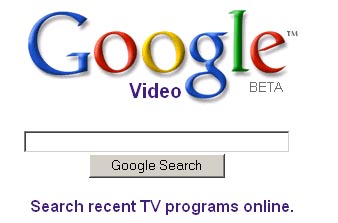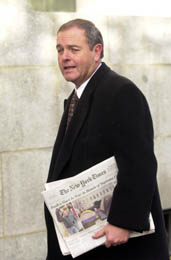Getting it straight...
John McManus guest lectured in my Journalism 132A class yesterday, speaking about the current and possible future decline of print journalism due to the rise of internet technology and market idealism in the newsroom - instead of journalistic values. image courtesy of the San Fransisco Chronicle
image courtesy of the San Fransisco Chronicle
As the class listened intentively, taking notes for possible quotes or jotting down the highlights, I sat back in my chair and let my webcam do most of the work. While I did jot down some quotes and questions, I was able to be more attentive knowing I could always revisit the speech.
And this is the genius of video/podcasting.
After I got home from my classes, I simply uploaded the speech onto Google video, filled out a page of submission information, and whala! The speech is online!
All you need to do to find it is type in "Andrew Venegas" or "John McManus", and it comes up. image courtesy of Google.com
image courtesy of Google.com
A student in my class even asked me when the video would be ready so she could check her quotes.
Anyone Out There?
This leads me to my point. Video/Podcasting - whatever you want to call it, is a tool that can enhance education, and journalism, not hamper or stop it. It empowers individuals to gather information more directly.
Whereas journalists used to have to "paint the picture" for their audience, bloggers can now show the audience just as easily with webcams and cameraphones. image taken from Blogger.com
image taken from Blogger.com
Gone are the days of "telling" in journalism - bloggers and individual citizens can audioblog from their phones or computer mics.
!Viva la revolucion!
Welcome to Journalism 2.0, where in depth analysis of the stories must expand. Let Backfence and private bloggers take care of school board meetings and everyday stories - newspapers and TV network journalists must cut the number of staff writers and go even farther.
Go farther, you say - cut staff... are you crazy?!
No offense to my fellow journalists out there - but the old paradigms simply won't work on the new business models. Someone call Dean Singleton, this baby's comin' down. image courtesy of Wikipedia.org
image courtesy of Wikipedia.org
Public programming like NPR, PBS, and non-profit newsrooms will hafta pick up the slack when the current big fish collapse or divest. And Americans will have to get it out of their heads that for-profit newspapers can always be trusted - because they won't, at least not for a while.
As the markets expand, it'll take time for guilds to go global. Until they do, business will have a significant advantage in telling them what they can and cannot print.
I am optimistic though, and all is not for not.
Wired for Life...
I remember teachers who used to tell me that in the future, everything would be wired - well the future is finally here.
Individuals, able to remain anonymus online, can delve into local news gathering without fear of retaliation.
Students can reach materials unimaginable ten years ago and connect to both professors and students. image courtesy of Wikipedia.org
image courtesy of Wikipedia.org
We can communicate better - learn faster - and compete more efficiently - now more than ever before in human history.
I hope someone on faculty is listening out there.
It's a brave new world, and the faster the University catches up, the better prepared students will be to meet the new challenges.
sjsu
soapbox prophet
technology
podcasting
john mcmanus
Andrew Venegas

